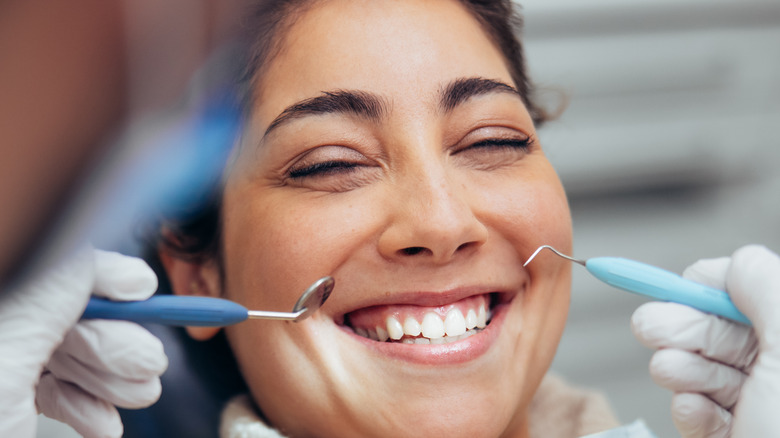The Truth About Dental Bonding
There are few things that can zap your confidence quicker than a dental issue. Fortunately, with advances in modern dentistry, most issues can be repaired. If you're struggling with a chipped, cracked, or discolored tooth, dental bonding may be the answer to your problems. Dental bonding, also known as tooth bonding, is a simple procedure that can solve a number of dental issues.
Unlike some other more complicated dental procedures, dental bonding usually doesn't require anesthesia, and in most cases, it can be completed in a single visit, per Healthline. The process begins by choosing a shade of resin that matches your natural teeth. Your dentist will then roughen the surface of the tooth and apply a bonding agent that makes the tooth adhesive. Once the tooth is prepped, the dentist will apply the composite resin on top of the liquid, molding and shaping the tooth as needed before hardening it all with an ultraviolet light.
The resin can cover cracks or chips, or correct discoloration as needed. As simple and pain-free as the procedure may be, however, there are still some things that you may want to keep in mind. Let's take a look at the risks and rewards of dental bonding.
What you need to know about dental bonding
Dental bonding doesn't come with any major risks or call for any special preparation. However, it is worth keeping in mind that the resin used on a bonded tooth isn't as strong as a natural tooth, per MedicineNet. Therefore, it is more likely to chip or separate from a tooth than other options, such as a crown, veneer, or filling. If you chew on hard materials like ice or hard candy, it is more likely to suffer such damage and require care. Smoking or drinking coffee can also cause the resin to become discolored.
Fortunately, these issues can be avoided with good dental care. By brushing your teeth twice a day and flossing daily, you can prevent staining, per the Cleveland Clinic. Avoiding the sort of foods and habits that damage your teeth will extend the life of your resin, as well as your teeth overall. Additionally, you need to maintain your 6-month dental cleanings and have the bonding checked by your dentist.
Dental bonding is on the cheaper side of dental procedures, coming in at around $300 to $500 per tooth, per Healthline. Keep in mind that even with appropriate care, dental bonding will need to be repaired or replaced every 5 to 10 years, requiring further cost and commitment. All in all, if you're prepared to properly maintain the teeth, dental bonding is a great choice for getting your smile where you want it to be.

